HEALTH
Our projects focus on reproductive, maternal, newborn and child health and wellbeing, conditions such as HIV and Aids, malaria and TB and issues like nutrition, sanitation and hygiene
RADIO IN ETHIOPIA – JEMBER AND BIIFTUU JIREENYAA
DIGITAL TOOLS FOR PRACTITIONERS IN INDIA – MOBILE KUNJI
HEALTH
Our projects focus on reproductive, maternal, newborn and child health and wellbeing, conditions such as HIV and Aids, malaria and TB and issues like nutrition, sanitation and hygiene
RADIO IN ETHIOPIA – JEMBER AND BIIFTUU JIREENYAA
DIGITAL TOOLS FOR PRACTITIONERS IN INDIA – MOBILE KUNJI
Jember and Biiftuu Jireenyaa
HEALTH / ETHIOPIA
“The two shows in Ethiopia were successful because they were absolutely rooted in local storytelling traditions and the ways in which people communicate with each other. Radio programmes were filled with the voices of ordinary Ethiopians, full of proverbs, music and real voices – this was no western-style show.”
Sophia Wilkinson, Acting Head of Health and Resilience
Jember and Biiftuu Jireenyaa
HEALTH / ETHIOPIA
“The two shows in Ethiopia were successful because they were absolutely rooted in local storytelling traditions and the ways in which people communicate with each other. Radio programmes were filled with the voices of ordinary Ethiopians, full of proverbs, music and real voices – this was no western-style show.”
Sophia Wilkinson, Acting Head of Health and Resilience
BACKGROUND STORY
In Ethiopia, maternal deaths due to pregnancy and childbirth account for 30% of all deaths of women aged 15-49.
In our community when we get pregnant we say that we are going to die and that we are not going to make it.”
Mother, Amhara
We knew that if we were going to improve maternal and child health we needed to communicate both to women of childbearing age and to men. That’s because men influence whether or not women access healthcare. So using our approach to health communication, our radio production team did something different to get men’s attention – in this case, baking bread.
In one episode of Biftuu Jereenya (Dawn of Life), the male presenter, encouraged by his female co- presenter, tried to make injera, an Ethiopian flatbread usually made by women, live on air. His attempt failed spectacularly but he laughed it off and gained a real appreciation of how hard women work.
The episode resonated with male and female listeners and inspired them to think differently about their roles.
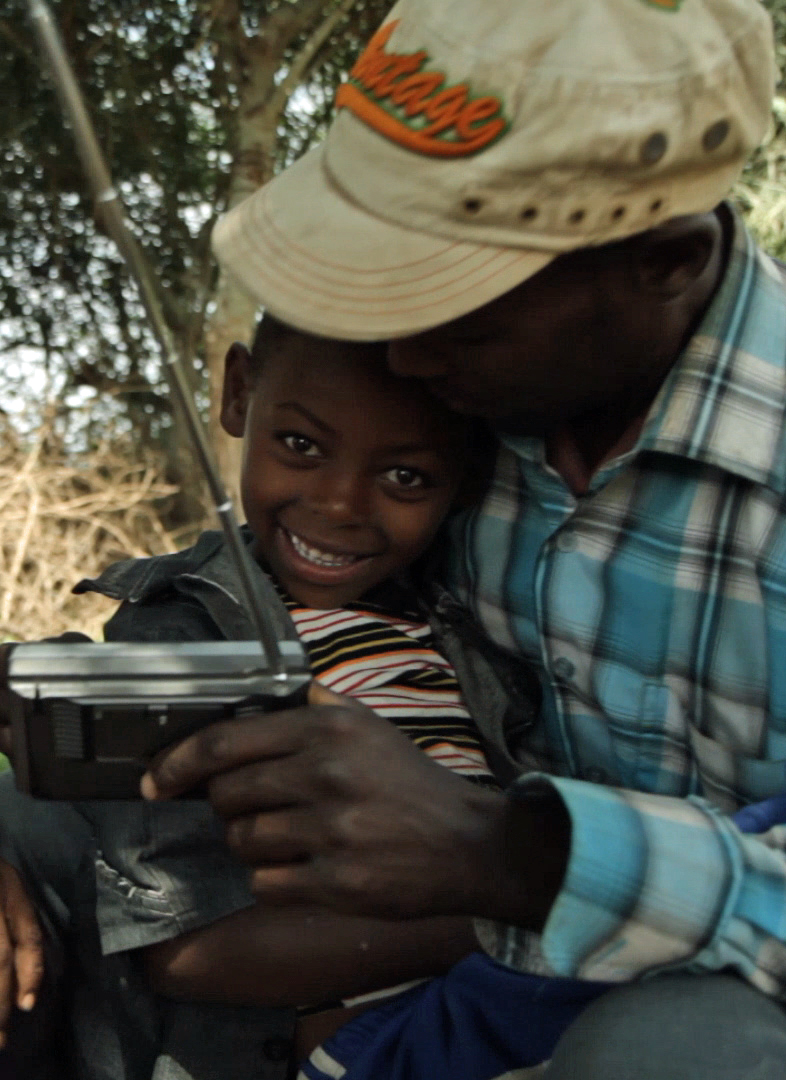
THE MEDIA IN ACTION
Since 2013, BBC Media Action has produced two radio magazine shows, Biiftuu Jireenya (Dawn of Life) and Jember (maternal light) to provide life-saving health information and raise awareness of health services for women and their families.
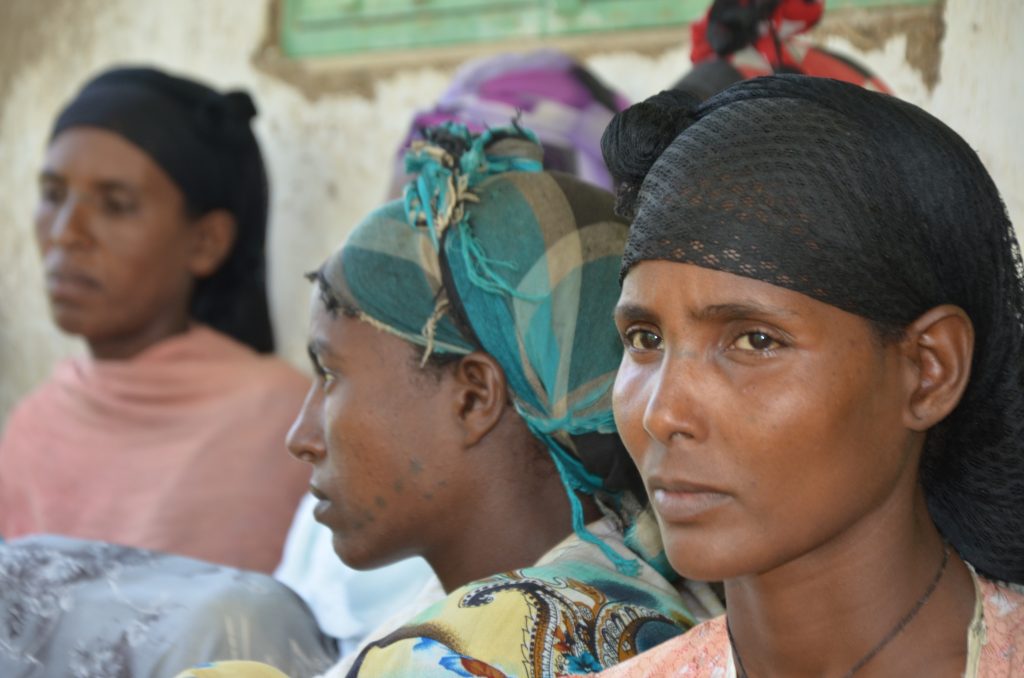
These two distinct programmes focus on the experiences of remote communities from the Amhara and Oromia regions, and were produced in two languages, Amharic and Afaan-Oromo, languages spoken by more than two thirds of the population. The programmes share advice in creative ways using stories, songs and poetry to reflect Ethiopia’s storytelling tradition. There are also ‘fly-on-the-wall’ recordings of what really happens behind a clinic door when a woman goes for an antenatal check-up.
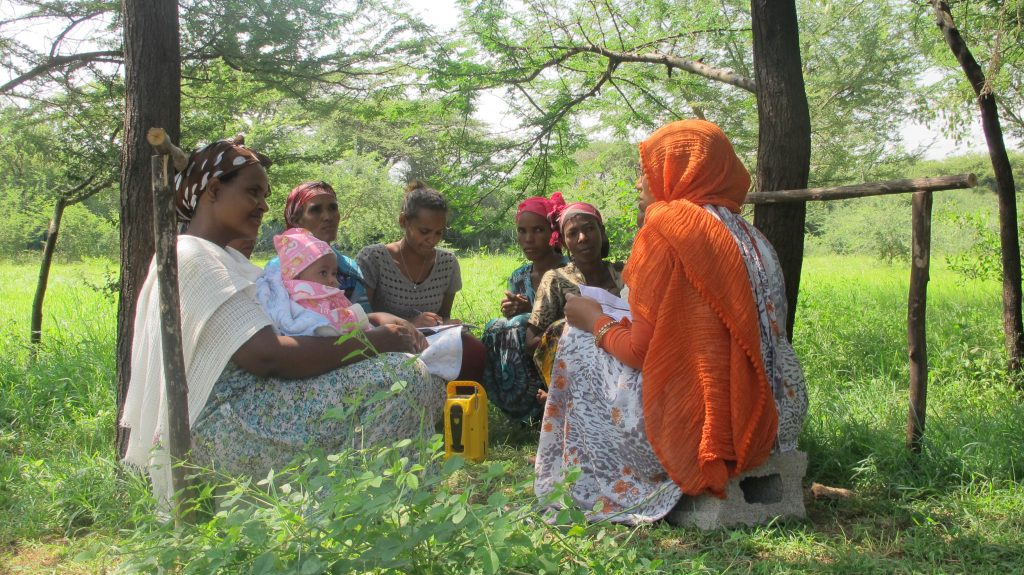
The radio broadcasts are still on air and are supported by outreach activities and discussion groups delivered with Ethiopia’s Ministry of Health’s Health Extension Programme. Listening groups held for men and women with little access to radio have extended the programmes’ reach and impact. These were built into Ethiopia’s ‘peer-to-peer’ information network – Health Development Army (HDA).
We designed non-commercial advertisements (PSAs – public service advertisements/announcements) to complement the radio programmes. They were used to spread simple messages about essential newborn care, safe delivery and how to prepare for birth.
IMPACT
In 2016, the programmes reached 21 million people, i.e. 48% of the adult population in Amhara, Oromia and Southern Nations Nationalities and People Region (SNNPR). Biiftuu Jireenyaa and Jember had loyal audiences, with four out of five listeners (79%) tuning in to at least every other episode. The audience was almost equally divided between men and women (47% female and 53% male) – a real achievement for radio programming about maternal and child health.
Many men told us they had never thought about how hard a woman’s life is, or that women should do less heavy lifting when pregnant.
During 2016, new fathers who listened were more likely to know how to prepare for birth and care for the new baby than new fathers who didn’t listen.
Members of the government’s Health Development Army reported that being part of our listening groups gave them more confidence to share critical health information in their community. And community members reported trusting the information given by HDA members more in areas where listening groups were running.
Most people (80%) who listened to Biiftuu Jireenyaa and/or Jember also heard at least one of the PSAs, and we found that the combination of the different programmes had a greater impact on listeners – showing how effective it is to use different ways to communicate the same ideas.
We have had examples of listeners saying ‘I didn’t know a man could do that.’ We learned about the programmes’ impact on men’s understanding of how they could support their wives better. They simply had not thought about how hard a woman’s life was, and how tough it is to do hard labour when you’re pregnant.”
Jember, as I understand, is a pathway from darkness to light. Our past was a darkness. It was uncivilised and lacked awareness. But now our pregnant women make follow-up checks, get vaccinated, go to the hospital whenever they feel sick. Jember taught us that no mother should die due to birth.”
Listener group members, Amhara
Our Global Health Stories explains more about the impact our health work has had in helping women have safer pregnancies and healthy babies.
Listen to an episode:
For more about the project, watch this:
BACKGROUND STORY
In Ethiopia, maternal deaths due to pregnancy and childbirth account for 30% of all deaths of women aged 15-49.
In our community when we get pregnant we say that we are going to die and that we are not going to make it.
Mother, Amhara
We knew that if we were going to improve maternal and child health we needed to communicate both to women of childbearing age and to men. That’s because men influence whether or not women access healthcare. So using our approach to health communication, our radio production team did something different to get men’s attention – in this case, baking bread.
In one episode of Biftuu Jereenya (Dawn of Life), the male presenter, encouraged by his female co- presenter, tried to make injera, an Ethiopian flatbread usually made by women, live on air. His attempt failed spectacularly but he laughed it off and gained a real appreciation of how hard women work.
The episode resonated with male and female listeners and inspired them to think differently about their roles.

THE MEDIA IN ACTION
Since 2013, BBC Media Action has produced two radio magazine shows, Biiftuu Jireenya (Dawn of Life) and Jember (maternal light) to provide life-saving health information and raise awareness of health services for women and their families.

These two distinct programmes focus on the experiences of remote communities from the Amhara and Oromia regions, and were produced in two languages, Amharic and Afaan-Oromo, languages spoken by more than two thirds of the population. The programmes share advice in creative ways using stories, songs and poetry to reflect Ethiopia’s storytelling tradition. There are also ‘fly-on-the-wall’ recordings of what really happens behind a clinic door when a woman goes for an antenatal check-up.

The radio broadcasts are still on air and are supported by outreach activities and discussion groups delivered with Ethiopia’s Ministry of Health’s Health Extension Programme. Listening groups held for men and women with little access to radio have extended the programmes’ reach and impact. These were built into Ethiopia’s ‘peer-to-peer’ information network – Health Development Army (HDA).
We designed non-commercial advertisements (PSAs – public service advertisements/announcements) to complement the radio programmes. They were used to spread simple messages about essential newborn care, safe delivery and how to prepare for birth.
IMPACT
In 2016, the programmes reached 21 million people, i.e. 48% of the adult population Amhara, Oromia and Southern Nations Nationalities and People Region (SNNPR). Biiftuu Jireenyaa and Jember had loyal audiences, with four out of five listeners (79%) tuning in to at least every other episode. The audience was almost equally divided between men and women (47% female and 53% male) – a real achievement for radio programming about maternal and child health.
Many men told us they had never thought about how hard a woman’s life is, or that women should do less heavy lifting when pregnant.
During 2016, the new fathers who listened were more likely to know how to prepare for birth and care for the new baby than new fathers who didn’t listen.
Members of the government’s Health Development Army reported that being part of our listening groups gave them more confidence to share critical health information in their community. And community members reported trusting the information given by HDA members more in areas where listening groups were running.
Most people (80%) who listened to Biiftuu Jireenyaa and/or Jember also heard at least one of the PSAs, and we found that the combination of the different programmes had a greater impact on listeners – showing how effective it is to use different ways to communicate the same ideas.
We have had examples of listeners saying ‘I didn’t know a man could do that.’ We learned about the programmes’ impact on men’s understanding of how they could support their wives better. They simply had not thought about how hard a woman’s life was, and how tough it is to do hard labour when you’re pregnant.”
Jember, as I understand, is a pathway from darkness to light. Our past was a darkness. It was uncivilised and lacked awareness. But now our pregnant women make follow-up checks, get vaccinated, go to the hospital whenever they feel sick. Jember taught us that no mother should die due to birth.”
Listener group members, Amhara
Our Global Health Stories explains more about the impact our health work has had in helping women have safer pregnancies and healthy babies.
Listen to an episode:
For more about the project, watch this:
Mobile Kunji
HEALTH / INDIA
In every situation we’re doing some fundamental things in common – what’s our goal? Then we look at a range of ways to respond. What’s worked before? Are there models we can use or re-work? What were the challenges and how can we do it differently now? We have a huge drive and ambition to be constantly better than our last piece of work.”
Priyanka Dutt, Country Director, India
Mobile Kunji
HEALTH / INDIA
In every situation we’re doing some fundamental things in common. What’s our goal? Then we look at a range of ways to respond. What’s worked before? Are there models we can use or re-work? What were the challenges and how can we do it differently now? We have a huge drive and ambition to be constantly better than our last piece of work.”
Priyanka Dutt, Country Director, India
BACKGROUND STORY
The state of Bihar’s 104 million people have an income that is 20% lower, on average, than the rest of India. Four out of five of them live in 45,098 villages with little or no education or access to mainstream media.
It has strongly traditional customs where women are seen as child-bearers and babies are a blessing – regardless of whether or not families have the means to nurture them. Poor health facilities and services, and low awareness of simple, healthy behaviours make the statistics for maternal and child health poor. Families and communities need encouragement and support to improve their health.
BBC Media Action’s challenge was to build awareness, and influence attitudes and social customs about beneficial health behaviours when mothers and babies are most at risk – during the 1,000 critical days from pregnancy until a child is two years old. The first solution was to work through the very large numbers of frontline workers supporting even larger numbers of mothers.
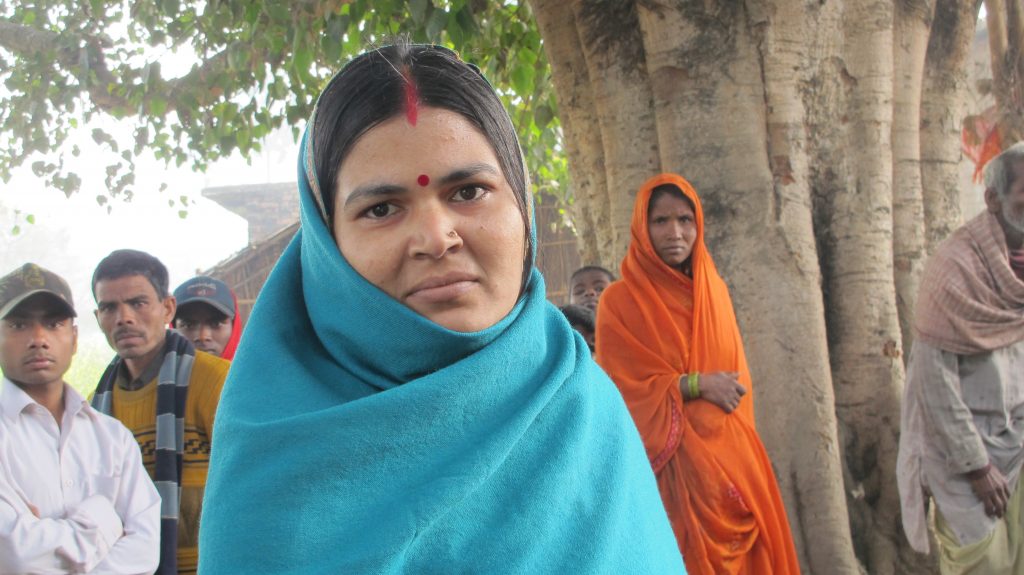
Key factors were:
- 88% of the beneficiaries lived in rural areas
- 70% were illiterate
- 18% watched TV
- 11% listen to radio
With only 27% of young mothers having access to traditional media, targeting them with information via TV or radio was never going to work. However, there was a major opportunity: some 82% of beneficiaries had access to mobile phones, and 85% of the 200,000 frontline health workers doing the outreach work had their own phone.
THE MEDIA IN ACTION
These findings provided the springboard for the highly creative – Mobile Kunji!
BBC Media Action’s response was to use a 360 degree approach ie many approaches all at once; face to-face communication, mobile phones, mass media advertisements, and community street theatre. Mobile Kunji, which means ‘guide’ or ‘key’ in Hindi, was an innovative audio/visual job aid which we developed for frontline health workers to use in their sessions with rural families.
Mobile Kunji had two components:
- A pack of 40 colour-coded cards with illustrations and key messages for each stage of the 33 months until a child is two years old.
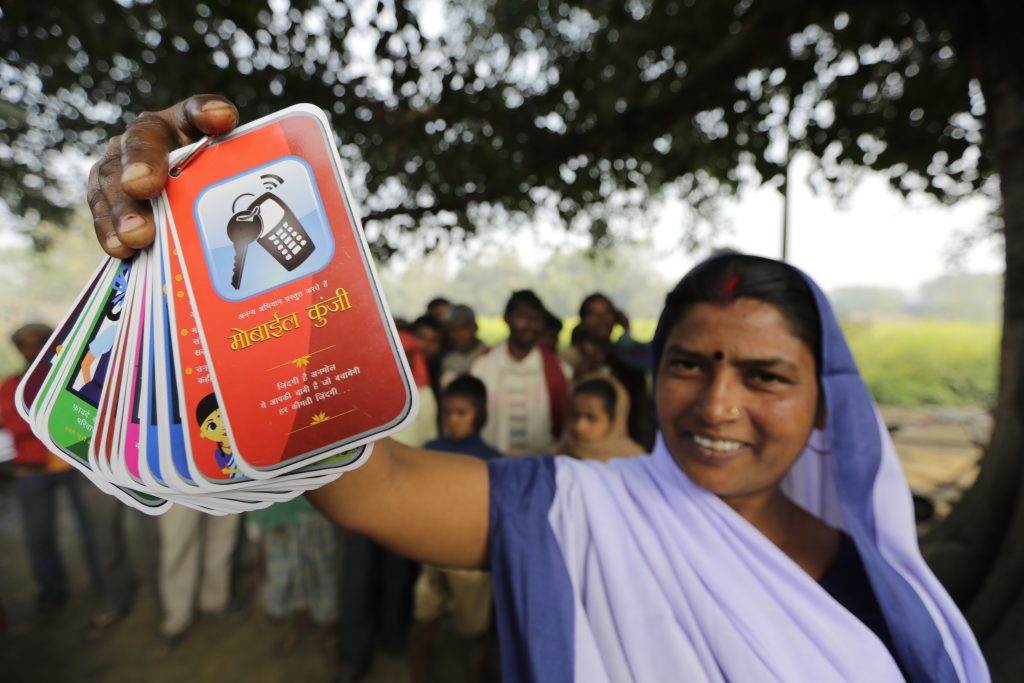
- Audio health messages delivered by the fictional character ‘Dr Anita’ on the frontline health worker’s phone. Each message was chosen via the colour coded cards and reached through its particular mobile phone number.
IMPACT
Mobile Kunji is highly valued by front line health workers beacause it communicated information simply and effectively to the mothers, who trusted the content, and it built their own confidence and knowledge. Mobile Kunji helped to make their home visits more effective and productive.
Earlier I used to speak alone but now this Mobile Kunji also speaks with me. Now I am sure that I won’t do anything wrong”
Frontline health worker, Patna
For more about Mobile Kunji, watch these:
For more about our health projects:
http://www.bbc.co.uk/mediaaction/what-we-do/health
http://globalhealthstories.com
BACKGROUND STORY
The state of Bihar’s 104 million people have an income that is 20% lower, on average, than the rest of India. Four out of five of them live in 45,098 village with little or no education or access to mainstream media.
It has strongly traditional customs where women are seen as child-bearers and babies are a blessing – regardless of whether or not families have the means to nurture them. Poor health facilities and services, and low awareness of simple, healthy behaviours make the statistics for maternal and child health poor. Families and communities need encouragement and support to improve their health.
BBC Media Action’s challenge was to build awareness, and influence attitudes and social customs about beneficial health behaviours when mothers and babies in Bihar are most at risk – during the 1,000 critical days from pregnancy until a child is two years old. The task was to do this consistently; the first solution was to work through the very large numbers of frontline workers supporting even larger numbers of mothers.

Key factors were:
- 88% of the beneficiaries lived in rural areas
- 70% were illiterate
- 18% watched TV
- 11% listen to radio
With only 27% of young mothers having access to traditional media, targeting them with information via TV or radio was never going to work. However, there was a major opportunity: some 82% of beneficiaries had access to mobile phones, and 85% of the 200,000 frontline health workers doing the outreach work had their own phone.
THE MEDIA IN ACTION
These findings provided the springboard for the highly highly creative – Mobile Kunji!
BBC Media Action’s response was to use a 360 degree approach ie many approaches all at once; face to-face communication, mobile phones, mass media advertisements, and community street theatre. Mobile Kunji, which means ‘guide’ or ‘key’ in Hindi, was an innovative audio/visual job aid which we developed for frontline health workers to use in their sessions with rural families.
Mobile Kunji had two components:
- A pack of 40 colour-coded cards with illustrations and key messages for each stage of the 33 months until a child is two years old.

- Audio health messages delivered by the fictional character ‘Dr Anita’ on the frontline health worker’s phone. Each message was chosen via the colour coded cards and reached through its particular mobile phone number.
IMPACT
Mobile Kunji is highly valued by front line health workers because it communicated information simply and effectively to the mothers, who trusted the content and it built the workers’ own confidence and knowledge. Mobile Kunji helped to make their home visits more effective and productive.
Earlier I used to speak alone but now this Mobile Kunji also speaks with me. Now I am sure that I won’t do anything wrong”
Frontline health worker, Patna
For more about Mobile Kunji, watch these:
For more about our health projects: